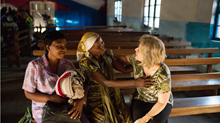Extending Family
"Are you watching CNN?" My friend Doug's urgent tone on the phone interrupted our family vacation. We were away from our Minneapolis home visiting my out-of-state in-laws.
"What happened?" I asked, afraid of his answer.
"The 35W bridge collapsed. Hundreds of cars are in the river."
I hung up my phone and turned on the TV. My husband and I could hardly comprehend the images of that familiar road lying crumpled in the water. We tallied up the people we knew who might've been on the bridge. We tried calling friends, but the phone lines in Minneapolis were jammed and we couldn't get through. So we watched and wondered and waited.
Later that night, I checked our e-mail to find a string of messages from our church small group. One member had written, "Is everyone okay?" "Yes," came the first reply. "Yes." "Yes." "We're fine." "Us too." Each following message contained a simple, yet profoundly moving assurance that our friends were safe.
Still, being so far away from our fellow Minnesotans at a time of tragedy felt wrong. While our Southern relatives were compassionate and concerned, they didn't share our sense of sadness and shock. Technically, we were with family, but, in so many ways, our real family seemed thousands of miles away, stunned and hurting.
I don't think I insult my nuclear family—or my in-laws, for that matter—by feeling as if my family extends far beyond those whose bloodline or last name I share. I like to believe only good comes when the idea of family expands to include those we love most, regardless of DNA.
One of our dear friends lives with us. When we returned from our vacation, she said, "I'm so glad to have my family back. You guys are more of a family to me than my actual family." Although she has a great relationship with her sisters and her parents, they don't know her quite as we do. We've been the ones sharing some of the difficult moments in her life over the last few years. They've gotten select glimpses, but we've seen it all—the tears, the frustrations, the joys.
Her greeting reminded me why family goes far beyond biology. Family suggests a collection of people who know us, who care for us deeply, who offer us a forgiving, understanding kind of love. For some of us, our biological families are indeed those people. But for others, those connections exist outside our homes. We find them at our work, in our churches, in our neighborhoods.
So many women I know—myself included—struggle with loneliness. Whether they're singles who don't want to be, wives whose husbands lack emotional intimacy, or moms whose responsibility for young children isolates them, they hunger for connection and closeness. And for women, such closeness isn't optional; it's an essential piece of our spiritual and psychological make-up.
One UCLA study found when women are stressed, we release the hormone oxytocin, which encourages us to seek the company of other women. Their presence helps release more oxytocin, which calms and reduces the feelings of stress. Our desire for relationships isn't just a social need. It's a hard-wired necessity.
That hard wiring isn't an accident. God created us for relationships. From the first moment of human existence, God knew it wasn't good for us to be alone. We fulfill the image of God when we unite with our fellow human beings. Relationships—between humans, between God and humanity—are at the center of the biblical narrative. Without them, we suffer.
Developing a family of friends has proven to be the balm for my loneliness. Some of these friends I see several times a week. Others I see only a couple times a year. But they're men and women who know me, who care for me deeply, who offer me a forgiving, understanding kind of love. They're the people who check in with me when a bridge collapses. They're the people who know the middle names of my children. They're the people who are signs of God's enduring love and care for me.
It's not good for me to be alone. And it's not good for you either. If you're struggling to feel connected to others, you're not the only one. We women need each other.
So how can you reach out to a lonely friend? How can you muster the courage to develop closer relationships with others? How can you start building a circle of friends who feel like family?
Copyright © 2010 by the author or Christianity Today/Kyria.com.
Click here for reprint information.
Read more articles that highlight writing by Christian women at ChristianityToday.com/Women
 Read These Next
Read These Next
 Keepin' It HolyHow honoring the Sabbath helps you remember what's really important
Keepin' It HolyHow honoring the Sabbath helps you remember what's really important
 My Week in a War ZoneThe most dangerous place in the world wrecked my heart and soul.
My Week in a War ZoneThe most dangerous place in the world wrecked my heart and soul.








 Homepage
Homepage